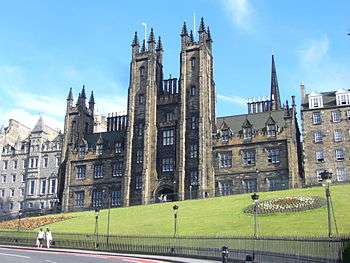General Assembly Hall of the Church of Scotland
The Assembly Hall is located between the Lawnmarket and The Mound in Edinburgh, Scotland. It is the meeting place of the General Assembly of the Church of Scotland.
History

Following the Disruption in the Church of Scotland in 1843, the emergent Free Church of Scotland urgently required a new theological college (New College) in Edinburgh, an Assembly Hall and a home for the Free High Church (the member of St Giles' Cathedral who left at the Disruption). A complex of buildings was thus designed by William Henry Playfair and built from 1846 onwards. The Assembly Hall itself was designed by David Bryce and built in 1858-9. The back of the Hall facing Castlehill was extended east by J. M. Dick Peddie in 1885, with further work in 1902-3. In 1934 the Free High Church vacated its building, which was adapted to become the New College Library.
In 1900, the United Presbyterian Church and a majority of the Free Church of Scotland united as the United Free Church of Scotland; the Assembly Hall was henceforth used by the newly united church. The United Free Church of Scotland and the Church of Scotland united in 1929. The Assembly Hall thus became the Assembly Hall of the reunited Church of Scotland. Overlooking the Moderator's chair, the centre of the south gallery was adapted to become the "Throne Gallery" for the Lord High Commissioner. Until 1929, the General Assemblies of the (old) Church of Scotland were held in St John's Highland Tolbooth Church (now 'The Hub'), the spire of which continues to overshadow the Assembly Hall and New College.
Interior
The Black and White Corridor occupies space on the north side and is so-named because of its distinctive chequered floor tiling. From the Black and White Corridor, steps lead down to the New College quadrangle (and Mound Place) and another staircase leads up to the Moderator's rooms and the Clerks' room (immediately above). Stairs also lead into the Rainy Hall of New College. The steps have been apocryphally attributed as the inspiration for the title of the book and film, The Thirty-Nine Steps, though changes in the courtyard have meant it is impossible to verify this.
Other uses
Scottish Parliament
Until 1999, the Assembly Hall was rarely used except for meetings of the General Assembly and performances during the Edinburgh International Festival.
The Scottish Constitutional Convention met in the Assembly Hall on 30 March 1989, at which A Claim of Right for Scotland, a call for the creation of a Scottish Parliament, was signed by 58 out of 72 Scottish Members of Parliament. It was organised by the Campaign for a Scottish Assembly.
Between 1999 and 2004 the Assembly Hall was the temporary debating chamber of the Scottish Parliament. The access to this facility was via a new glazed porch, discreetly placed in the SW corner of Mylne's Court off the Lawnmarket in the midst of some of the University of Edinburgh's Halls of Residence. All traces of this porch were eradicated, and the west wall where it stood returned to a blank wall, immediately after the new parliament opened. The old (and uncomfortable) dark green leather bench seating was removed. Temporary (and removable) desks and seating were installed and the Hall was carpeted. The Church of Scotland used the Edinburgh International Conference Centre for the 1999 General Assembly and the Usher Hall in 2001. In other years, the Parliament vacated the Assembly Hall for the Church.
The Presiding Officer of the Scottish Parliament had an office within the Assembly Hall buildings; all other parliamentary offices were located in the former Midlothian County Buildings or the former Lothian Regional Council offices (since demolished), both located on George IV Bridge.
Following the completion of the new Scottish Parliament Building at Holyrood in October 2004, the Assembly Hall was refurbished with new theatre-type upholstered seating. The Church of Scotland's Board of Practice and Procedure set up an Assembly Hall Development Group to consider how the building could be more widely used in future. The Assembly Hall is now regularly used for conferences and performances, as well as for the annual General Assembly in May.
Edinburgh International Festival
The first dramatic success of the Edinburgh International Festival happened in 1948 and it was staged to great acclaim at Assembly Hall on the Mound — an adaptation of Sir David Lyndsay's The Thrie Estaites, the first performance of this play since 1552.[1]
Edinburgh Festival Fringe
One of those extra uses for the hall is as a venue for the Edinburgh Festival Fringe each August. The hall is operated as a venue by the co-incidentally named company Assembly, who are named after, but organisationally unconnected to, the Assembly Rooms, which they also run during the Fringe.
See also
References
- ↑ Bruce, Festival in the North (1975), pp. 25-6.
- J. Gifford, C. McWilliam and D. Walker, The Buildings of Scotland: Edinburgh, Penguin Books, 1984, ISBN 978-0140710687.
External links
Coordinates: 55°56′59″N 3°11′42″W / 55.94972°N 3.19500°W